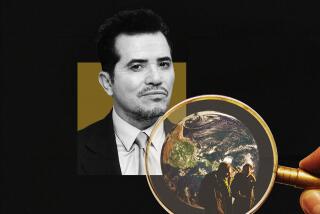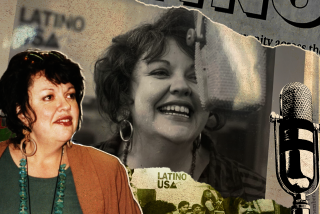‘Buried Mirror’ Cable Airing Deplored : Television: A public broadcasting official claims that PBS’ decision to pass on the miniseries about Latino culture limited its audience.
- Share via
The loss of a significant miniseries about Latino culture to cable after PBS declined to pick it up has drawn fire from a public broadcasting official charged with getting more Latino programming on the air.
“The Buried Mirror: Reflections on Spain and the New World” was developed with PBS in mind, as the centerpiece of the Smithsonian Institution’s look at the 500th anniversary of Columbus’ voyage to the Americas, according to Alicia Maria Gonzales, director of the Smithsonian Quincentenary program.
But it is airing instead on the Discovery Channel this week--the final installment is tonight at 7 and 11--with its five hourlong episodes pared to 46 minutes each to accommodate commercials.
PBS says it passed on the series, which was narrated and written by one of Mexico’s leading authors, Carlos Fuentes, because the public network had already developed “Columbus and the Age of Discovery,” which aired last year.
“That’s crazy,” said Jose Luis Ruiz, director of the National Latino Communications Center, whose agency is funded by the Corporation for Public Broadcasting for the specific purpose of bringing more programming about Latinos to public TV and radio.
“Maybe that’s exactly why we don’t see more Latino programming in public broadcasting--because they think that if they do one or two programs, they don’t need to do any more,” he said in an interview.
On Wednesday, Melinda Ward, PBS’ director of drama, performance and cultural programming, said that the public network simply couldn’t accommodate “The Buried Mirror” in its schedule or budget.
“The problem was that at the time (Smithsonian) came to us, we had other programs which had already been funded,” Ward said.
And she said that besides Columbus, the network was developing a series for 1993 through Boston public-television station WGBH called “The Other Americas,” which will look at Latin American issues and history.
But Ruiz said it was shortsighted to think that those two series--neither of which would premiere in 1992, the year of the 500th anniversary of Columbus’ voyage--could be the last word on the impact of Spain on the Americas. And, he said, “The Buried Mirror” is unique because it presents the material from the point of view of Fuentes, who is Mexican, rather than of a European or North American documentarian.
“When we look at ourselves, we have to look at ourselves from many points of view,” he said.
In hopes that public television--which can be seen throughout the country, as compared to the Discovery Channel, which is available in 62% of U.S. homes--does eventually show the series, the National Latino Communications Center has paid $50,000 for the right to broadcast it for a period in 1993. But the five programs will not be part of the national PBS schedule; Ruiz and his associates will have to lobby regional networks and individual stations to run them.
Overall, Ruiz said, PBS has tried to get some programming about Latino culture and history on the air, but he complained that the effort lacks consistency.
“I will champion them in one sense,” he said, because the network has aired such programs as Luis Valdez’s “La Pastorela” and “A Bowl of Beings,” featuring the L.A. comedy troupe Culture Clash. “But I will say in another sense that I think many of these things were accidents. And we can’t continue this way.”
More to Read
The complete guide to home viewing
Get Screen Gab for everything about the TV shows and streaming movies everyone’s talking about.
You may occasionally receive promotional content from the Los Angeles Times.






